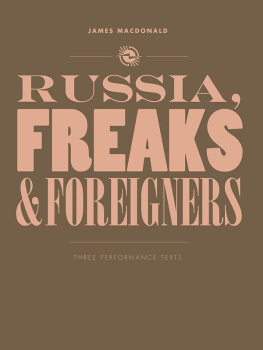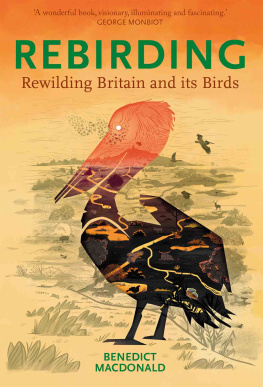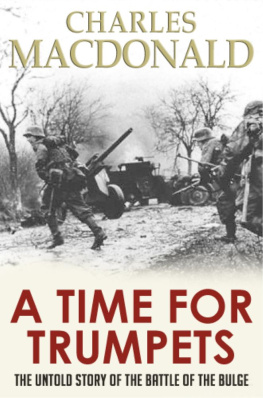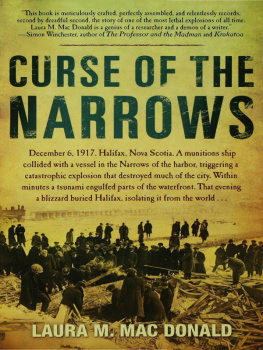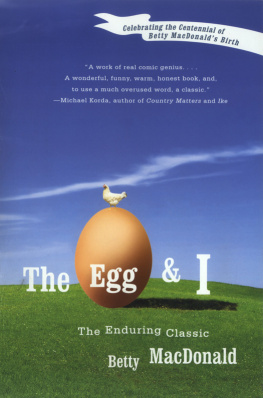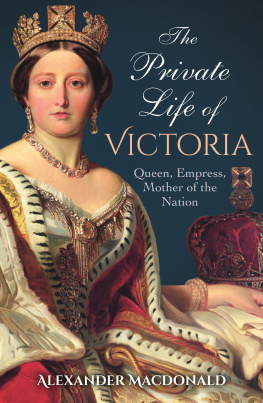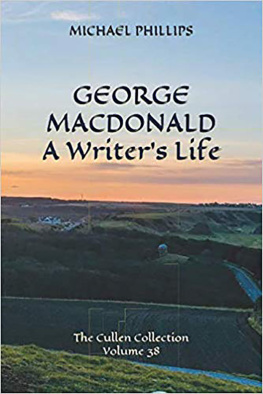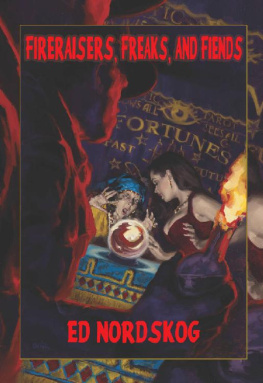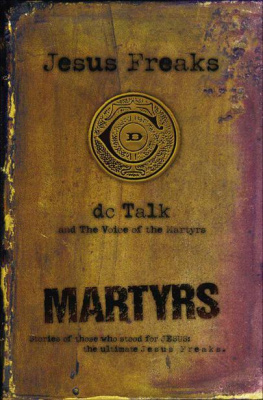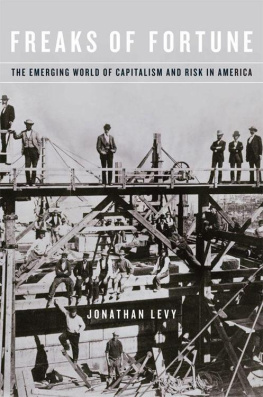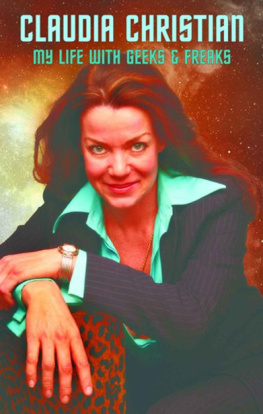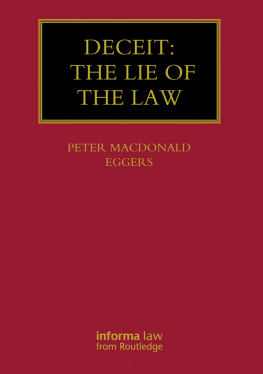Russia, Freaks and Foreigners
Three Performance Texts
Russia, Freaks and Foreigners
Three Performance Texts
James MacDonald

To Mother, Pop, Susan and Inna
Four of Gods truly elect
First Published in the UK in 2008 by
Intellect Books, The Mill, Parnall Road, Fishponds, Bristol, BS16 3JG, UK
First published in the USA in 2008 by
Intellect Books, The University of Chicago Press, 1427 E. 60th Street, Chicago,
IL 60637, USA
Copyright 2008 Intellect Ltd
All rights reserved. No part of this publication may be reproduced,
stored in a retrieval system, or transmitted, in any form or by any means,
electronic, mechanical, photocopying, recording, or otherwise, without
written permission.
A catalogue record for this book is available from the British Library.
Cover Design: Gabriel Solomons
Copy Editor: Holly Spradling
Typesetting: Mac Style, Nafferton, E. Yorkshire
ISBN 978-1-84150-186-4/EISBN 978-1-84150-229-8
Printed and bound by Gutenberg Press, Malta.
INTRODUCTION
Russia, Freaks and Foreigners: Three Performance Texts does not constitute a trilogy in the formal sense, but several things serve to unite the texts and to justify their collection as a unified book. They are all texts whose first performances were directed by one man. Two of the three were written as part of an undergraduate module in interpretive acting, led by the same man. All three share thematic concerns with various forms of difference. Consummately, I hope, they provide the theatre reader with a dynamic experience of this complex and far-reaching subject personally, socially, culturally.
Performance texts are primarily for performance, and their dissemination in book form necessitates a discussion of their performance characteristics. This is especially true of new texts (whose performance history is extremely short). I have been ideally served in this respect by having accompanying essays by colleagues of long standing who can discuss the texts in ways that newly published texts are not often discussed in print. Martin Harvey, who directed the performances, discusses the theatrical qualities of the texts; Peter Thomson has known my work for thirty years and gives a historical perspective on its genesis; Thomas Fahy has done extensive work on the literary/dramatic nature of difference and brings this to bear in a detailed analysis of Bread and Circus Freaks; Su Elliott closes the volume with her reflections on what it was like to perform one of these texts. Their views were expressed independently, and it may well be that they even contradict one another in certain respects. But this is the essence of critical discourse, and any author is privileged indeed to have his/her work focused in this way. Whatever they say, each contributor is a MacDonald expert as well as a distinguished practitioner, and their comments can only enhance the readers isolated perusal of these texts.
As for my own view (for what it is worth), I have always sought to employ disability much as Dostoyevsky uses epilepsy, to comment on the human condition as a whole. Many writers have used deformity in this way (Rabelais, Gogol, Nathanael West, Carson McCullers), and I feel in kindred spirit with them. Bread and Circus Freaks, for example, was intended to be a contemporary re-working of the Russian vaudeville, a comic play often centred on mistaken identity. As Peter Thomson has noted, questions of identity have rarely been absent from all my work, and Martin Harvey has given a partial glimpse into the reasons why. Transforming life into artefact, with regard to Circus Freaks, I meant the title to refer to all the characters, as Thomas Fahy notes, and for each character to do a turn in presenting her/his take on society. Each is somehow an outsider, and each has something distinctive to say about society. Without their separateness, they would not be outsiders.
I meant the play to be funny, and audiences have definite views not only on the subjects they accept as comic but also on the ways this comedy can be purveyed. Peter Thomson talks about this in relation to a 1984 play he helped produce in London. Peter is quite right that the agent who was helping me at the time had serious commercial misgivings about disability as a subject. She said she had had a terrible time trying to market A Day in the Death of Joe Egg and that the characters in my play were even more depressing to watch. A Times reviewer seemed to bear this out when he averred that Whose Life Is It Anyway? offers a far better view of disability than my play. But inasmuch as Brian Clarkes play is really about euthanasia, its disability statement could almost be seen as fascistic. And I ear-wigged on two patrons in wheelchairs who said of my plays verisimilitude, Hed have to be disabled (in order) to know that.
Perhaps Peter is correct when he suggests that it takes direct knowledge of what he calls the other side to fully appreciate depictions of it. But shying away from a subject (for whatever reason) is hardly the best way to respond to it, and theatre has always been in the vanguard when it comes to tackling difficult subjects. Tom Fahy has done splendid work in examining the whole history of the freak show. But outlawing such exhibitions may simply result in removing deformity from the social agenda. One aim of the publication of all three texts is to place issues of deformity and dislocation squarely before the public in such a way that they must respond beyond polite detachment, and unrestrained laughter is a clear sign of honest engagement. In this way the performance of all three texts was an attempt to push back two boundaries presenting the subject at all, and then challenging audiences to find the displays comic. Neither aim was carried out in a spirit of hostility toward the audience. I was not asking anyone to confront suppressed prejudices. But equally, failure to acknowledge a subject can be as cruel as actively promulgating it. For all the brutality of some of the characters behaviour, they do not flinch from the subjects of deformity and dislocation, and their candour was what we attempted to bring before audiences.
This was certainly so in the case of Martin Harveys production of Bread and Circus Freaks, and so it has remained in our work with students on the other two texts in this volume, all of which has summoned a tremendous amount of courageous commitment from the performers. This may even exceed one authors fondest dream(s). Performers in the first play were willing to risk unpopularity on the progressive fringe to achieve something of devastating novelty, and then student performers have been eager to commit themselves to work that goes beyond progressive curriculum, involving workshop engagement with issues that have remained hidden for far too long. I cannot exaggerate the extent of this courage; indeed, I have no wish to in paying the fullest tribute to all the contributors to this volume (among whom I am happy to include Sam King, Roberta Mock and everyone else at Intellect). What you have done here is genuinely remarkable, as the life of this volume will clearly bear out. For this reason alone, I have high hopes (and unstinting gratitude) for it.
James MacDonald
PART ONE: TEXTS
BREAD AND CIRCUS FREAKS
A One Act Vaudeville
First performed at the Finborough Theatre, London, on 6 March 2002, under the direction of Martin Harvey and with the following cast:
Next page
